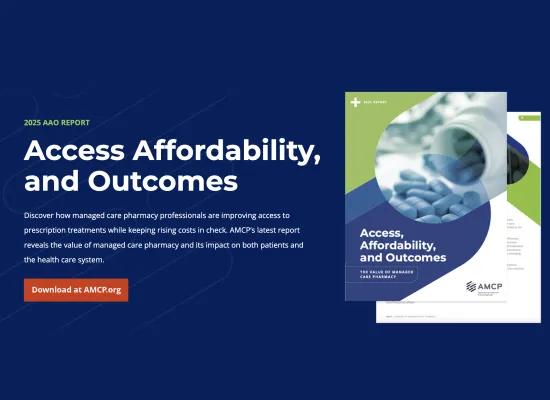
AMCP Applauds Introduction of the “Pharmaceutical Information Exchange (PIE) Act of 2017”
Alexandria, Va., April 26, 2017 — While improved adherence to diabetes medications is associated with higher drug costs, it also is associated with lower inpatient, outpatient and emergency room costs, according to a study in this month’s Journal of Managed Care & Specialty Pharmacy (JMCP), the peer-reviewed journal of the Academy of Managed Care Pharmacy.
The study, “Effect of Diabetes Treatment-Related Attributes on Costs to Type 2 Diabetes Patients in a Real-World Population,” examined costs associated with factors such as improved efficacy, adherence, and reduced risk for hypoglycemia (i.e., low blood sugar).
In general, documented hypoglycemia events and higher A1c levels are associated with higher 1-year and 3-year cumulative total costs. Improved adherence, meanwhile, led to higher 1-year total costs, given that greater adherence results in greater medication costs. Improved adherence, however, did not have an effect on 3-year total costs, implying that over time adherence to medications results in increase of medication cost and a lowering of other costs such as inpatient, outpatient, and ER costs.
Total direct costs of Type 2 diabetes mellitus (T2DM) in the U.S. exceeds $174 billion each year, with $27 billion in medical costs ($8.6 billion for oral agents and $3.7 billion for insulin) and the remainder related to other medical expenditures (e.g., hospital inpatient care, cost of complications, and visits), the study found. Incidence and prevalence of T2DM is anticipated to increase in coming years, with roughly 33% of the U.S. population projected to have T2DM by 2050, researchers noted.
Hypoglycemia is a clear driver of total costs for patients with T2DM. The study found a 59.4% increase in total 1-year costs for patients who had a hospitalization/ER visit for a hypoglycemic event. Hypoglycemic episodes requiring medical attention incur an average of $1,161 direct cost per episode. “Therefore, avoidance of hypoglycemic events with safe and effective medications has the potential to greatly decrease the burden of T2DM management overall,” the authors concluded.
Study authors are Jie Meng, MIHMEP; Roman Casciano, MSc; Yi-Chien Lee, MS; Lee Stern, MS; Dmitry Gultyaev, BS; Liyue Tong, PhD; and Brice Kitio-Dschassi, MSc, MPH, MBA. The study is published in the April issue of JMCP and can be accessed here.
About JMCP
The Journal of Managed Care & Specialty Pharmacy publishes peer-reviewed original research manuscripts, subject reviews, and other content intended to advance the use of the scientific method, including the interpretation of research findings in managed care pharmacy. It is dedicated to improving the quality of patient care by providing its readers with the results of scientific investigation and evaluation of clinical, health, service, and economic outcomes of pharmacy services and pharmaceutical interventions, including formulary management. www.jmcp.org.
Featured News & Resources
See Full CalendarAward Applications Open
AMCP eLearning Day: Nexus Encore
AMCP 2026 Registration Opens
Upcoming Events
AMCP offers a wide variety of educational opportunities, from events and webinars to online training.







